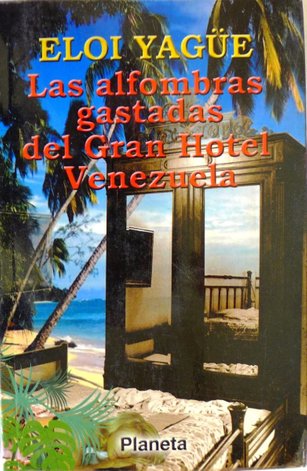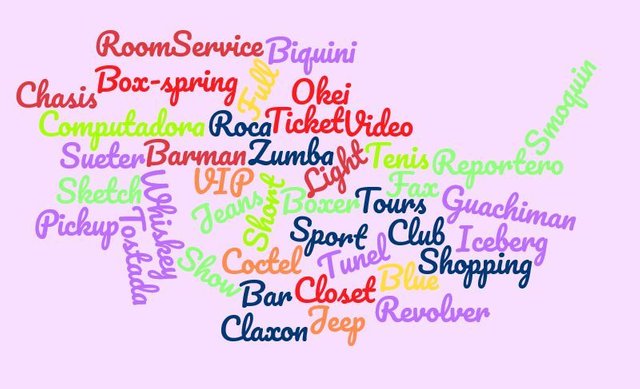Anglicisms in Spanish Language and Culture (Part II)
In the previous post we were saying that languages tend to adopt selective patterns that already exist in their systems and that these isolated borrowings rarely altered them considerably.
That kind of linguistic selectivity can be appreciated in the Anglicisms used in Venezuela. Some of them could be easily adapted to previous forms or patterns and were eventually completely assimilated (fax >faxear, flirt >flirtear). Some others are used in their original form, but cannot be inflected or modified (stop can be used as a noun [se comió el stop = He ran the stop sign], but it cannot be transformed into the verb estopear). Yet others, even if assimilated and modified become nothing but fashionable traits and, in time, will no longer be used (claxon < Klaxon, broder < brother, guatecloc < water closet).
 Source
Source
From Rómulo Gallegos in the 1940s to Otero Silva in the 1970s, Venezuelan authors have included in their works some samples of the fashionable Anglicisms of their time. However, they always handled them with care, used them sparingly, and, to some extent avoided them in formal written language. In the last decades, the number of Anglicisms has increased exponentially. The new Venezuelan literature seems to be more willing to experiment with the new forms of the language. Authors are less apprehensive regarding purity and correctness.
One supporter of this new wave is Eloi Yagüe. Even though his detective novella, Las Alfombras Gastadas del Gran Hotel Venezuela (1999) might not have an extraordinary literary value (it has flaws in terms of form and execution), its merit resides in the accurate exposition of a contradictory socio-historic reality and uninhibited use of the language. Yagüe attempts to reconcile the contrived lyricism of the author with the grotesqueness of the narrator and the rest of the characters. The result is a sub-real detective-like narration in which the nuances of the language and the plot reveal the ambiguities of a culture that struggles to find its own identity in the middle of a labyrinth of foreign influences and models.

The novel portrays a reporter who is trying to become a writer and chooses to write a detective novel. To find his muse, he goes to the province. He decides to stay in a formerly renowned hotel in a remote area of the north coast. What he finds is an abandoned hotel with ragged carpets, trapped in a town ruled by reckless and ignorant people who live on the glories of the past and hide from the uncertainty of the future.
The fascination for all that was foreign is one of the features of this glorious past. Yagüe uses the language to reconstruct the social tensions of an epoch while revealing a linguistic reality that is perhaps the most authentic and characteristic Venezuelan feature. Detached from purist pretensions, Yagüe utilizes in his novel linguistic elements from the opposite sides of the academically acceptable spectrum: Venezolanisms and Anglicisms. Thus, his novel becomes a particularly fascinating linguistic corpus.
I put together a word cloud with about fifty of the most easily identifiable Anglicisms used by Yagüe in Las Alfombras Gastadas del Gran Hotel Venezuela.

Linguistic Analysis.
The analysis of the Anglicisms found in Yagüe’s novel show that the borrowing in Venezuelan Spanish is mainly lexical. Almost all the words used in the novel are nouns. These nouns are predominantly used in its original form (light, ticket, club), although they are pronounced with Spanish variations. In fact, most of the words are used in italics probably to denote their foreignness. Some of the neologisms that are spelled differently from the English form (tenis, tunel, coctel) have been already officially included in Spanish dictionaries, as well as the words derived from them (tenista, coctelera).
The only syntactic feature in Yague’s novel that can be considered anglicized is the inversion of noun-adjective form. Yagüe tends to place the adjectives before the nouns, as in famosa novela, vieja máquina, cercano terminal (5). This form is not entirely alien to Spanish, though, and Yague mostly keeps the Spanish Noun-Adjective form. Spanish, like all synthetic languages, is syntactically flexible, and there are instances where placing the adjective before the nouns sounds even better than otherwise. As Pountain says, this kind of combination only fulfills semantic needs and fills morphological gaps (120).
 Source
Source
In Spanish it is common to use adjectives as nouns, for instance, bueno becomes los buenos (‘good, the good ones’), loco becomes el loco (‘crazy, the crazy one’). The opposite, to use a noun as an adjective, in less frequent, but it was an established form used in the past (118). An interesting example of the noun + noun combination in Yagüe’s novel is the use of the acronym VIP as an adjective in zona VIP, ‘VIP area’ (107) and camisas sport, ‘sport shirts’ (80). Even when the Anglicism is used, concurring with Pountain’s conclusions, there is “no possibility of changing the order of the two nouns” (119).
Morphological and phonetic changes.
 Source
Source
The different academies that rule the Spanish language tend to prescribe the way people should pronounce, write, and use words, especially foreign words when their adoption becomes inevitable. However, arbitrariness prevails in many cases, and regional variation can considerably alter the way an Anglicism is assimilated. In terms of word formation, Spanish speakers can add a vowel to English words ending in a consonant, especially t, d, v, k, and r. For instance, reporter becomes reportero, bat becomes bate. They could also either pronounce the final vowel that in English is silent, as in chance, or drop it as in misil.
Some borrowings might never be officially accepted in the way they are pronounced (flas from flash), but this initial phonetic alteration can be the prelude of a future coinage (stress becomes estrés and from there the adjective estresado, stressed). Other predictable phonetic alterations made by Spanish speakers are: dropping the final consonant, as in estó from stop; adding an e before words starting with s, for example, espor from sport, esmoquin from smoking; replacement (almost always) of initial w sound by a g sound, for instance, guachiman from watchman, gualla from wire; and changing the point of articulation of some consonants. For instance, V (labio-dental) will generally be pronounced B (bilabial), as in /bideo/ < video.
In terms of spelling, double consonants tend to be reduced (tenis < tennis, túnel < tunnel, misil < missile), w changes for u (suiche <switch), vowels are reduced to the minimum required in Spanish to produce the sound, as in suéter < sweater, turista <tourist, friser < freezer, and Sh is replaced by ch, (chutar <shoot).
 Source
Source
Most of the linguistic loans present in Yagüe’s novel are words derived from fashion (sweater, smoking, blazer, boxer), technology (fax, jeep, cellular), or terms associated with social status (whiskey, poker, club, tourism). This sample represents an interesting historical and socio-linguistic corpus in terms of the kind of contact Venezuela has had with the US and the kind of borrowing the speaker are willing to adopt.
No significant syntactic change attributable to English influence was observed in the language sample (limited as it can be); instead, it can be perceived in Yague a certain authorial satisfaction and easiness for being able to use Anglicisms without much apprehension.
Languages are living creatures unwilling to contain their impulses and needs. Purists throughout history have not been successful in preventing linguistic contact and its subsequent borrowings. They have also failed in prescribing language use. English did not lose agency or prestige because of the influence of Latin, Danish, Norse, or French, for instance. On the contrary, English benefited enormously from those contacts because they allowed English people to interact with, blend with, and profit from other cultures while the language grew and became more functional. In the same way, Spanish has benefited from having to import what it lacks economically, technologically, and culturally. Linguists should trust the selective system of the language and allow its speakers to participate and benefit from the richness of other languages. The malleability of the Spanish language makes possible the immediate incorporation of new concepts and their expansion inside and beyond the limits of its linguistic system.
 Source
Source

Works Cited
Kishida, Maria José. “Los Angliscismos en Espanol. Puntos Para el Debate.” http://usuarios.iponet.es/ddt/anglicismos.htm
Pountain, Christopher J. “Syntactic Anglicisms in Spanish: Exploitation or Innovation?” The Changing Voices of Europe. Social and Political Changes and Their Linguistic Repercussions, Past, Present and Future. Eds. M. M. Parry, W.V. Davies and R.A.M. Temple. Cardiff: U of Wales P, 1994. 109-24.
Pratt, Chris. El Anglicismo en el Español Peninsular Contemporameo. Madrid: Gredos, 1980.
Teschner, Richard V. “Exploring the Role of Hispano in the Dissemination of Anglicisms in Spanish.” Foreign Language Annals 7 (1974): 681-93.
Tió, Salvador. Lengua Mayor. Ensayos Sobre el Español de Aquí y de Allá. Rio Piedras: Plaza Mayor, 1991.
Vega, Ana Lydia. “Pollito Chicken.” Vírgenes y Mártires: (Cuentos). Rio Piedras: Antillana, 1983.
Yague, Eloi. Las Alfombras Gastadas del Gran Hotel Venezuela. Caracas: Planeta, 1999.
Click the coin below to join our Discord Server
)
We would greatly appreciate your witness vote
To vote for @adsactly-witness please click the link above, then find "adsactly-witness" and click the upvote arrow or scroll to the bottom and type "adsactly-witness" in the box
Thank You



)





Very good your work, @hlezama. Although I have not read the novel that you quote, I know of many other novels that use Anglicisms, especially those Venezuelan novels called "oil novels", which try to narrate the activities and lifestyles of Venezuelans next to foreigners, especially North Americans These novels emphasize how oil workers (mostly Venezuelans) assimilate the language of their employers (mostly "gringos") and "version" it according to how they hear it. In our country, we can see from the lowest to the highest social classes, use phrases from other languages, whether English, French, Italian or Latin. Such is the case of the words boutique (fr.), Blue jeans (ing.), In fraganti (lat.), Karate (jap.), Among many others. These turns can sometimes be funny, because you can find unusual and picturesque cases. In Venezuela there are people called Junior, Lady, Shogun and stop counting. Although if we are going to see how the Kardashian have named their children (North, Holy, Chicago, Truth) we know that there is a little madness and little creativity in some names. Thanks for sharing.
Excelent comment, @nancibriti.
Oil exploitation in our country, as it was probably the case in other countries too, marked the beginning of the linguistic "invasion".
When it comes to outrageous naming, we do have some cases that can compete with the Kardashians for the title.
Hi, @adsactly!
You just got a 0.25% upvote from SteemPlus!
To get higher upvotes, earn more SteemPlus Points (SPP). On your Steemit wallet, check your SPP balance and click on "How to earn SPP?" to find out all the ways to earn.
If you're not using SteemPlus yet, please check our last posts in here to see the many ways in which SteemPlus can improve your Steem experience on Steemit and Busy.
Very good work, @hlezama, with great academic and specialized content. As some theoretician said, it is in literature (as a written genre, or at least collected later in the scriptural) where the traces and the process of linguistic changes remain, although we know that these begin in oral use. Hence, the sample you give us from Yagüe's novel is very useful. The Spanish of America, or its Venezuelan concretion, has undoubtedly been (and will continue to be) nurtured by Anglicisms. There is no other form of coexistence between languages than interrelation and mutual enrichment. Greetings.
PS: I don't know if you've read Junot Díaz (I haven't been able to), but they say that he represents a very rich case of a combination of English and Spanish in his narrative.
Absolutely, @josemalavem. Thanks
I have read Díaz. I read his collection of short stories, Drown and The Brief Wondrous Life of Oscar Wao. Amazing prose, gifted storyteller. Language is key in Díaz's work. My students laughed outloud at his "spanglish" and obsenity. His characters are very realistic and fun.
Why do you call Spanish a synthetic language? I don't think I have ever heard that word used to describe a language before.
Interesting discussion.
What's with the downvote? It really unnerves me. Not deserved at all.
Good questions.
Most languages are synthetic, which means that the way words are arranged to create sentences (syntactic relationship) rely heavily on inflections (particles added to express a grammatical function) or agglutinations.
For example, verbal tenses, number (plural or singular), person (first/I/, second /you/, third /he, she/), etc.
In Spanish, an inflection on the verb is enough to know who is the subject:
escribo (I write), escribes (you write), escriben (they write), escribimos (we write), escribe (s/he writes).
In the case of verbal tense:
Compare
yo como (I eat), yo comí (I ate), yo comeré (I'll eat) in Spanish, an inflection, a particle added to the end of the word marks the verbal tense.
In some cases, the inflection added is derivational, that is, itchanges the grammatical category of the word (sing /verb/...singer /noun/). --er is one of the many bound morphemes in English; it does not mean much alone, but added to another morpheme...
In spanish we have cantar (to sing), cantante (singer); so ...nte would be the bound morpheme that helps create new grammatical categories.
The opposite of synthetic languages would be analytical or isolating languages (such as Chinese or Vietnamese), which rely more on separate word, articles or prepositions to create the syntactic relationships. Modern English has become more analytic, but shares features of both categories.
As for the downvoting issue, we have been told it has nothing to do with the actual content of the post, which makes it more unfair, and that we should not be worried about it. It is a worrying matter nonetheless. Hopefully it will stop. I am just trying to create good content here.
You are doing that. I see you are not alone too. Still, I find even the smallest downvotes depressing, I can't imagine what it must feel like to get one of those huge ones.
Thanks for that in depth explanation. I went right to the language of math which, since it describes abstracts, might be wrongly considered synthetic but it fits the criteria for analytical it seems to me.
Thank you. Yes, it feels bad, but it is beyond our control. Justice and fairness are tricky concepts; in the hands of the powerful they can be dangerously tricky.
About the languages, I guess the terms emphasize the combination of depenent parts in the former vs the separation of elements in the latter.